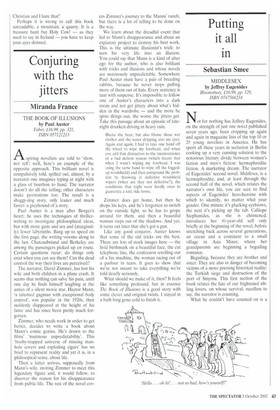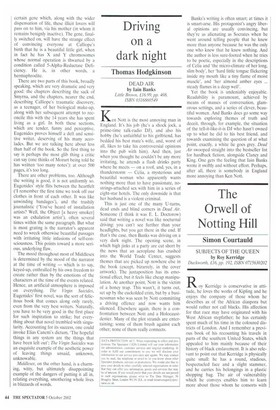Putting it all in
Sebastian Smee
MIDDLESEX by Jeffrey Eugenides Bloomsbuty, £16.99, pp. 529, ISBN 0747560234 Not for nothing has Jeffrey Eugenides, on the strength of just one novel published seven years ago, been cropping up again and again in magazine lists of the top 10 or 25 young novelists in America. He has spent all these years in seclusion in Berlin cooking up a very cunning solution to the notorious literary divide between women's fiction and men's fiction: hermaphrodite fiction. A marketing dream. The narrator of Eugenides' second novel, Middlesex, is a hermaphrodite, and, at least through the second half of the novel, which relates the narrator's own life, you are sure to find aspects of Eugenides' hero/heroine with which to identify, no matter what your gender. One minute it's plucking eyebrows, the next it's picking up the tab. Calliope Stephanides, as she is christened, introduces her 4I-year-old self only briefly at the beginning of the novel, before stretching back across several generations, an ocean and a continent to a small village in Asia Minor, where her grandparents are beginning a beguiling romance.
Beguiling, because they are brother and sister. They are also in danger of becoming victims of a more pressing historical reality: the Turkish siege and destruction of the port of Smyrna. This first section of the book relates the fate of our frightened sibling lovers, on whose survival, needless to say, the narrator is counting.
What he couldn't have counted on is a
certain gene which, along with the wider dispensation of life, these illicit lovers will pass on to him, via his mother (in whom it remains benignly inactive). The gene, finally switched on, will have the strange effect of convincing everyone at Calliope's birth that he is a beautiful little girl, when in fact he has X and Y chromosomes whose normal operation is thwarted by a condition called 5-Alpha-Reductase Deficiency. He is, in other words, a hermaphrodite.
There are two parts of this book, broadly speaking, which are very dramatic and very good: the chapters describing the sack of Smyrna, and the chapters, nearer the end, describing Calliope's traumatic discovery, as a teenager, of her biological make-up, along with her subsequent attempt to reconcile this with the 14 years she has spent living as a girl. In both these sections, which are tender, funny and perceptive. Eugenides proves himself a deft and sensitive writer, deserving of his many accolades. But we are talking here about less than half of the book. So the first thing to say is perhaps the most glib thing a critic can say (one thinks of Mozart being told he has written 'too many notes'): at over 500 pages, it's too long.
There are other problems, too. Although the writing is good, it is not uniformly so. Eugenides' style flits between the heartfelt CI remember the first time we took off our clothes in front of each other. It was like unwinding bandages'), and the trashily journalistic (`You've heard of installation artists? Well, the Object [a heavy smoker] was an exhalation artist'), often several times within the same paragraph. But what is most grating is the narrator's apparent need to wreck otherwise beautiful passages with irritating little infusions of self-consciousness. This points toward a more serious, underlying flaw.
The mood throughout most of Middlesex is determined by the mood of the narrator at the time of writing — which is to say, keyed-up, enthralled by his own freedom to create rather than by the emotions of the characters at the time of the events related. Hence, an artificial atmosphere is imposed on everything. The Virgin Suicides, Eugenides' first novel, was the sort of felicitous book that comes along only rarely, even from the very best writers. Naturally, you have to be very good in the first place for such inspiration to strike; but everything about that novel trembled with singularity. Accounting for its success, one could invoke Elias Canetti's dictum, 'The hopeful things in any system are the things that have been left out'; The Virgin Suicides was an exquisite example of the aesthetic power of leaving things unsaid, unknown, unknowable.
Middlesex, on the other hand, is a charming, witty, but ultimately disappointing example of the dangers of putting it all in, relating everything, smothering whole lives in blizzards of words.





































































 Previous page
Previous page